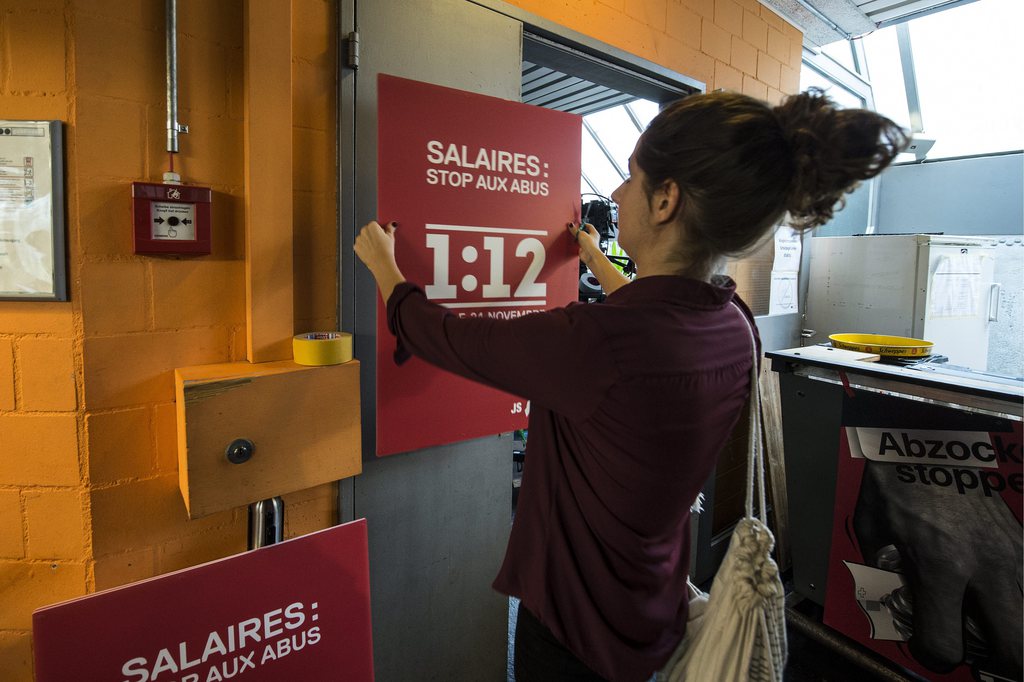Swiss voters may impose a minimum wage on industry

To reduce poverty and fight wage dumping, Swiss trade unionists are campaigning for a nationwide minimum wage. Employers’ groups are opposed, arguing that this would be government interference in a free market economy.
Whether it is fat-cat salaries or the plight of the working poor, rates of pay have been a recurrent focus in recent political debate in Switzerland. The upcoming vote on May 18 is the third time in just over a year that Swiss voters are being called upon to decide how much – or how little – jobs should be worth.
The initiative “to protect equitable pay (minimum wage initiative)”, launched by the Swiss trade union federation SGB/USS, calls for a legal minimum wage of CHF22 ($25) an hour, which means a monthly paycheck of about CHF4,000 for a full-time job of 42 hours a week. It is proposed that this amount should be topped up periodically to keep pace with other wages and prices.
The popular initiative on a minimum wage was submitted by the Swiss Trade Union Federation in 2012, with 112,301 valid signatures.
It demands that the federal government and the cantons protect rates of pay in Switzerland and promote the setting of minimum pay rates in collective agreements.
It also calls for the introduction of a legal minimum wage of CHF22 an hour nationwide.
The government and a majority in parliament (composed of parties of the right and centre), recommends rejection. To be accepted on May 18, it has to win a majority both of the voters and of the cantons.
Fairness versus realism
This pay rate corresponds roughly to the current upward limit for low-paying jobs, held by about 330,000 workers, or about one out of ten employees in this country.
“With the legal minimum wage provided for by the initiative, all these people would receive a decent rate of pay,” trade union spokesman Ewald Ackermann told swissinfo.ch. “What is at issue here is remunerating work fairly. Everyone should be able to make a living from his own work.”
“We are not defending a policy of low pay rates, but it is clear that pay policy should be realistic and flexible”, counters Alexandre Plassard of the Swiss employers’ association SAV/USI.
“If minimum pay rates are fixed at a level that is too high and uniform, instead of being negotiated by the social partners on the basis of local conditions and economic possibilities, some jobs are sure to disappear.”
Examples are to be found in some Swiss industries that are already under pressure from the strong franc. With a minimum wage of CHF4,000 per month, costs of production would increase and Swiss companies would no longer be competitive internationally, according to Swissmem, a body representing the country’s mechanical and electrical engineering industries.
There would be offshoring, rationalisation and automation – in other words, job losses – warns Swissmem president Hans Hess.
It would cost the jobs of precisely those workers that the initiative is aimed to help – people with few or no job skills, Hess predicts. These people would not be likely to find a job if they had to be paid at CHF22 an hour.
“This is just scare tactics,” scoffs Ackermann. “Opponents painted these scenarios in 1998 when the unions were fighting for a minimum wage of CHF 3,000. Then the major retailers adjusted their pay packets, as did the hotel and restaurant sector which between 1998 and 2013 increased its minimum wage by more than 50%. And yet there were no job cuts. In fact, the rate of unemployment in that sector dropped from 13 to 10.5%.”
The trade union spokesman points out that the overwhelming majority of low-paid jobs belong just to the domestic economy, like personal services (hairdressing, beauty care, laundries), the retail trade, and the hotel and restaurant sector. “How could they start offshoring? Would the Swiss go to Poland or Hungary to get a haircut?”
Ackermann concedes that some agricultural businesses could experience difficulties if the minimum was set at CHF4,000 a month. “But in that sector they need to innovate in their production methods,” he says. As for the export industries, only “a very marginal proportion” would be affected.
The national medianwage is an median of all pay rates in the country: 50% of salaries are above this figure and 50% are below it.
In 2010, taken as the reference year for the setting of the legal minimum wage at CHF4,000 a month, the gross median wage in Switzerland was CHF5,979 per month; breaking this figure down further, it was CHF5,221 for women and CHF6,397 for men.
The median wage was consistently higher in three regions – Zurich (CHF6,560), northwestern Switzerland (CHF6,437) and the Lake Geneva region (CHF6,422) – while it was considerably lower in Ticino (CHF5,358). In terms of occupation, it ranged from CHF3,695 in personal services (hairdressing, beauty care, laundries, etc.) and CHF4,024 in hospitality jobs to CHF9,500 in financial services and CHF9,292 in management consulting.
According to an internationally accepted definition, low-paying jobs are those earning less than two-thirds of the gross median wage. In 2010, low pay rates in Switzerland were those under CHF3,986 gross monthly for 40 hours a week.
Overall there were about 275,000 jobs in the low-paying category, or 10.5% of all jobs. In terms of economic sector, the largest category of jobs with an hourly wage below CHF22 was to be found in personal services (51%).
There were also concentrations to be seen in the clothing industry, domestic work and cleaning (41-45%), as well as in hospitality, agriculture and restaurants (over 30%). The proportion of low-paying jobs was noticeably higher among women than among men: 18.4% as against 5.9%.
(Source: Federal Statistics and SECO)
National minimum or world record?
The employers’ group finds the amount of the minimum wage stipulated in the initiative unacceptable. They say it would mean a “world record”, even taking account of the cost of living and the median wage here.
But they are also opposed to the very idea of a minimum wage set by the government and valid for the whole of Switzerland. This “is contrary to the principle of pay rates being set in accordance with market conditions, and it is incompatible with a liberal economic system. It is not the job of the government to set the amount of pay rates – that is the prerogative of the social partners,” insists Plassard.
According to the employers’ spokesman, the union initiative would destroy the well-established Swiss system of collective bargaining among the social partners, which takes account of real conditions in the different regions and industries. The cost of living varies a great deal from one region to another in Switzerland, he adds.
For the unions, the initiative is a tool to put an end to pressure on pay rates in regions and economic sectors that have frequent recourse to imported workers from other countries – even though the voters recently approved an initiative from the rightwing People’s Party “against mass immigration” to block foreign workers coming to Switzerland.
It is currently unclear how the People’s Party initiative will be implemented and what will happen to the bilateral accords between Bern and Brussels.
But even if Switzerland has no more free movement of persons with the European Union, the text of the trade union initiative calls for quotas for foreign workers depending on the needs of the economy, as Ackermann points out.
“If required to pay a minimum wage of CHF22 an hour, employers will no longer have an interest in bringing in workers from abroad who do not have the same level of training as those in Switzerland – just so they can pay them less.”
Minimum pay and collective bargaining
There is still more to the trade union initiative: it is intended to be “an effective tool against all forms of wage dumping, because it requires the federal government and cantons to promote collective agreements specifying the minimum rates of pay usual for the location, the type of work and the industry, and ensuring their implementation”, points out Ackermann.
At present, only 49% of employees work under a collective agreement in Switzerland and only 80% of those have a collective agreement that sets minimum wage limits.
This requirement for the government to promote collective agreements is a thorn in the side of employers opposing the initiative: such a provision “would in fact create a compulsion to enter into collective labour agreements. We are advocates of freedom of contract for the social partners, and we believe that the negotiation of collective agreements must remain voluntary. We are very much attached to freedom of contract,” emphasises Plassard.
(Translated from Italian by Terence MacNamee)

In compliance with the JTI standards
More: SWI swissinfo.ch certified by the Journalism Trust Initiative













You can find an overview of ongoing debates with our journalists here . Please join us!
If you want to start a conversation about a topic raised in this article or want to report factual errors, email us at english@swissinfo.ch.